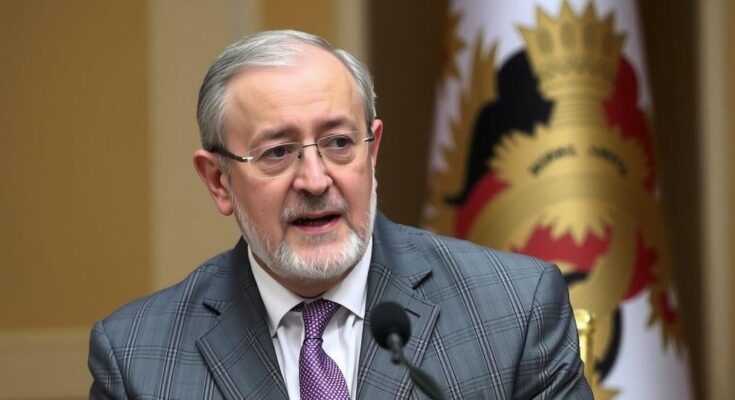Ahmad al-Sharaa, leader of Hayat Tahrir al-Sham, announced that it may take up to four years to hold elections in Syria and up to three years to draft a new constitution. He emphasized the requirements for political dialogue and census for valid elections, as HTS is set to dissolve before a crucial national dialogue in March aimed at establishing a transitional government. In the background, Israeli airstrikes persist in targeting military infrastructure, demonstrating the ongoing volatility in the region.
Ahmad al-Sharaa, the leader of Hayat Tahrir al-Sham (HTS), indicated that Syria may require up to four years to conduct elections. In a recent interview with the Saudi television network Al-Arabiya, he projected that drafting a new constitution could take as long as three years and emphasized the necessity of a comprehensive population census for any legitimate electoral process. Al-Sharaa noted the importance of political dialogue among Syria’s diverse factions in the aftermath of decades of authoritarian rule under the al-Assad dynasty.
He pointed out the extensive rebuilding needed for the war-torn nation’s infrastructure, stating, “The chance we have today doesn’t come every five or 10 years,” and expressed a desire for the new constitution to be enduring. Al-Sharaa will maintain his position as de facto leader until March 1, when a dialogue aimed at establishing a transitional government is set to commence, during which HTS is expected to dissolve.
Furthermore, recent Israeli airstrikes continue to affect the region, with a report indicating 11 fatalities, primarily civilians, during a strike targeting al-Assad’s forces. Israeli military operations in Syria have persisted since the onset of the civil conflict in 2011, primarily aimed at Iranian-backed groups. Amidst these dynamics, Al-Sharaa expressed interest in sustaining strategic relations with Russia while engaging with various factions, including the Kurdish-led Syrian Democratic Forces, on security integration efforts in northeastern Syria.
Overall, the anticipated national dialogue and its outcomes will be pivotal in shaping Syria’s political landscape and facilitating national unity as the country emerges from years of turmoil.
The Syrian conflict, beginning in 2011, has led to extensive devastation and a fragmented political landscape, primarily characterized by the authoritarian rule of President Bashar al-Assad. The rise of various factions, including HTS, has altered the power dynamics in the country. Al-Sharaa’s comments encapsulate the challenges presented by decades of dictatorial governance and the complexities of rebuilding a nation that has endured significant civil unrest and warfare. The necessity of a new constitution and electoral process reflects the need for a legitimate governmental framework to foster peace and stability. The ongoing military operations by Israel and interactions with foreign powers such as Russia and the United States complicate the situation further, underscoring the geopolitical stakes involved in Syria’s future.
In conclusion, Ahmad al-Sharaa’s statements highlight the extensive timeframe and challenges Syria faces in establishing a credible electoral process following years of conflict and authoritarian rule. The proposed drafting of a new constitution and the necessity for political dialogue and census funding underscore the complexities of re-establishing governance. Furthermore, the ongoing military actions and international relations play a crucial role in shaping the future political climate in Syria. The planned national dialogue will seek to unify the country under a stable and inclusive governance framework.
Original Source: www.euronews.com




